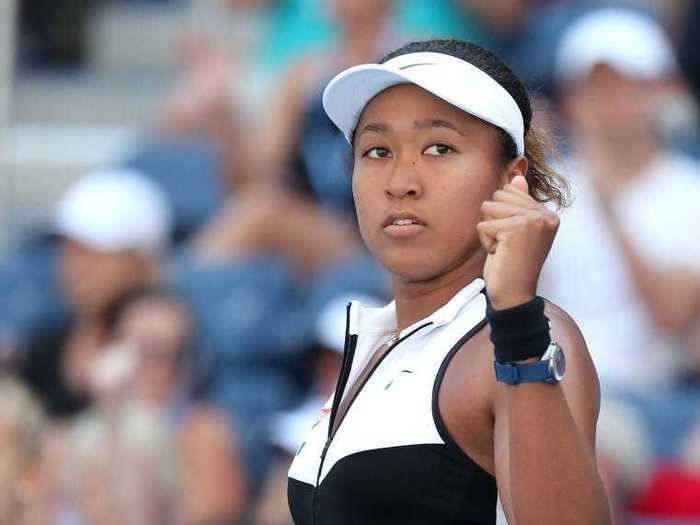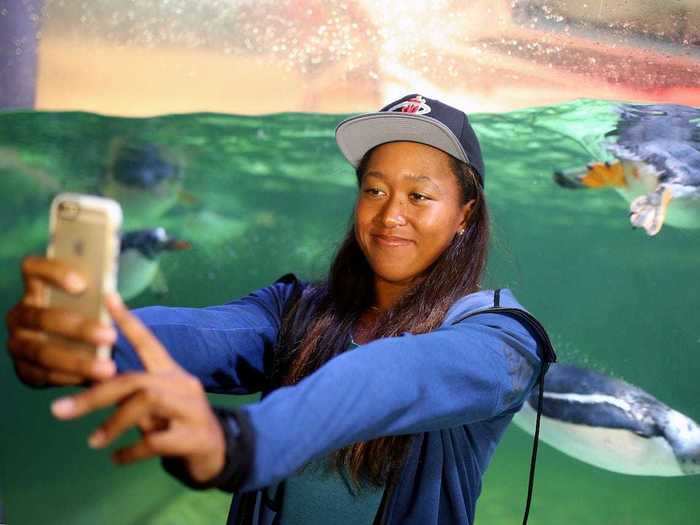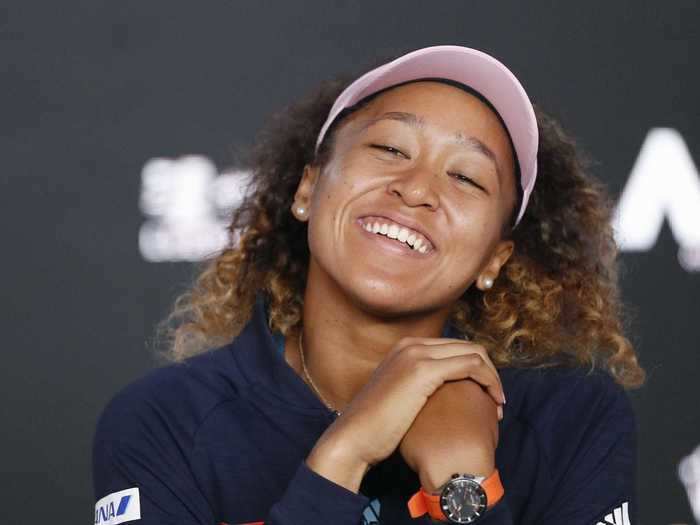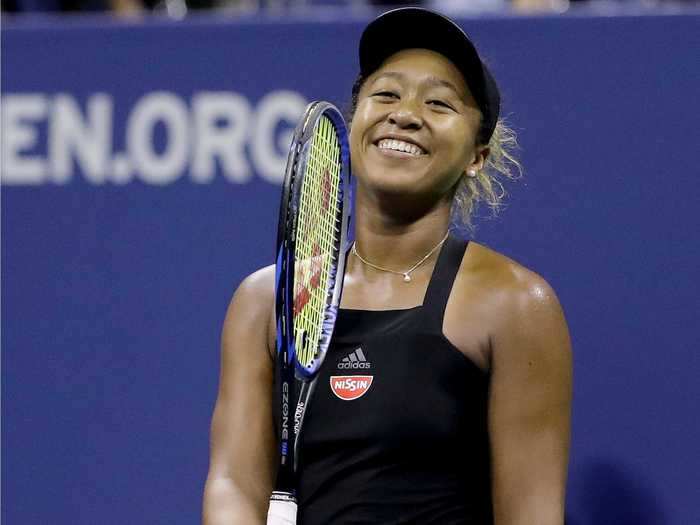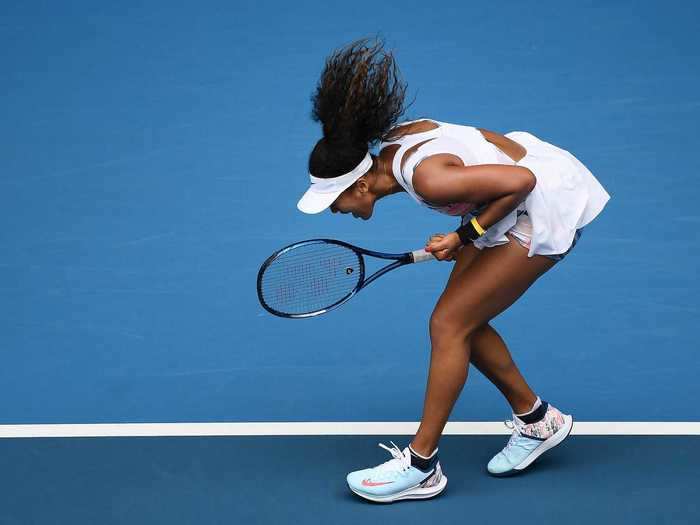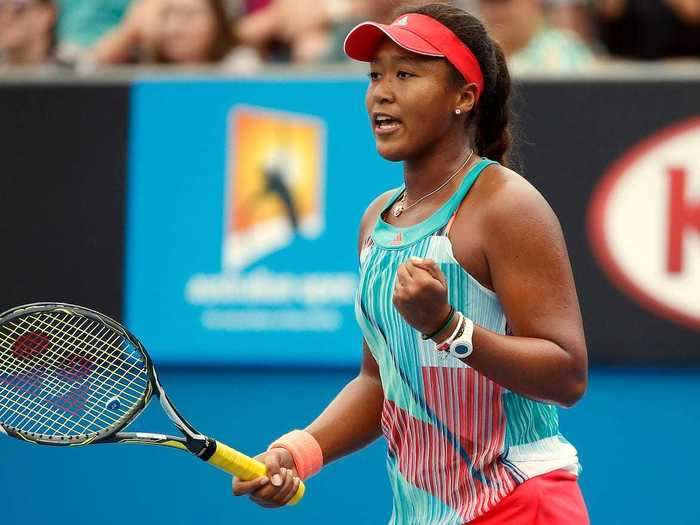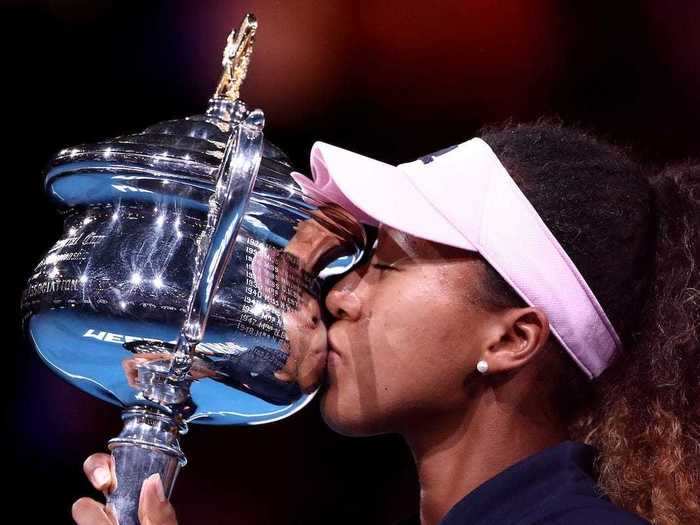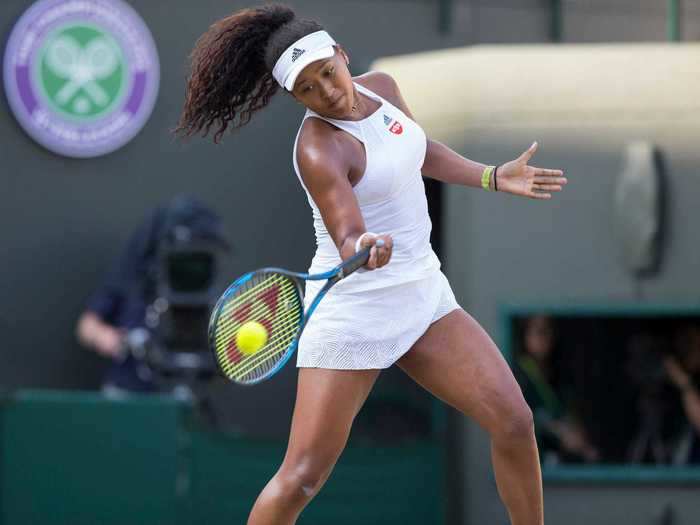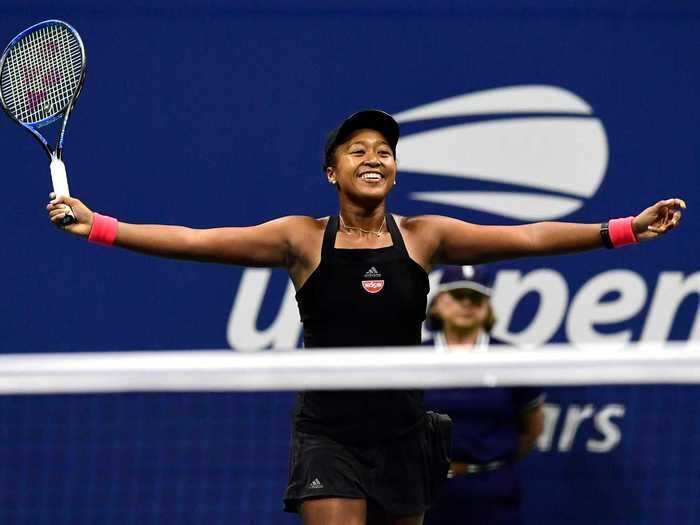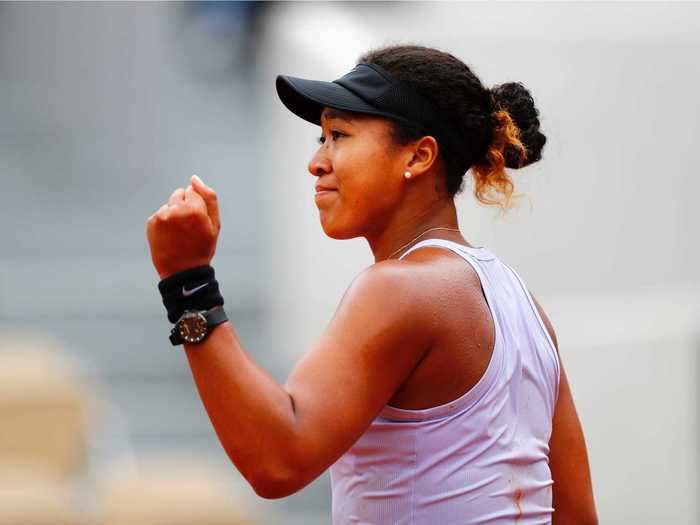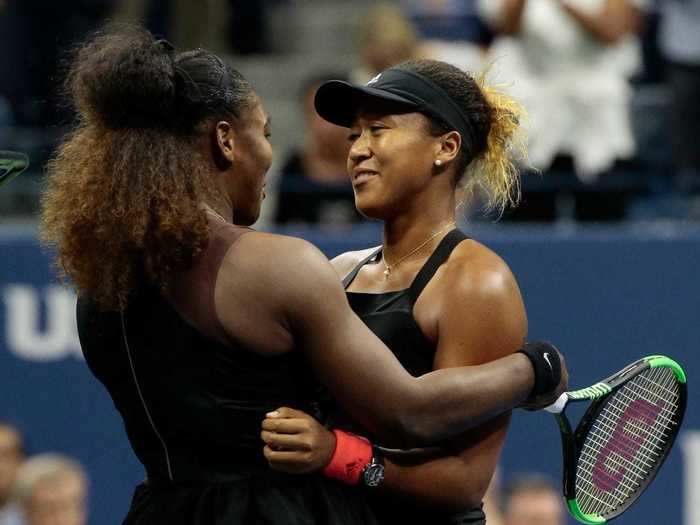Naomi Osaka earned more than $37 million last year.Tim Clayton - Corbis/Getty Images
- Naomi Osaka, at age 22, is the world's highest-paid female athlete with $37.4 million in earnings over the last 12 months.
- On the heels of two back-to-back Grand Slams and on the cusp of playing in the Olympics, Osaka landed several lucrative endorsement deals last year.
- Much of Osaka's career was spent out of the public eye, but her time in the spotlight is only just beginning.
Naomi Osaka is the highest-paid female athlete in the world.
The 22-year-old tennis star raked in $37.4 million in the past year. It's a feat that involves several records broken: Serena Williams was the world's highest-paid female athlete for four years running, and Maria Sharapova previously held the title for the most money earned by a female athlete in a single year.
Osaka has seemingly come out of nowhere. A professional tennis player by the age of 16, she was largely taught how to hit the court by her father and avoided the junior tennis circuit growing up.
Osaka didn't work with her first professional tennis coach until age 18. Within two years, she was finally thrust into the international limelight when she won two Grand Slams back-to-back — which involved a major upset for Osaka's role model, Serena Williams, in the US Open.
Set to compete in the World Olympics for Japan, Osaka now has a string of lucrative endorsement deals under her belt.
A representative for Osaka didn't immediately respond to a request for comment from Business Insider regarding her endorsement deals and their financial details.
Here's how Osaka became the highest-paid female athlete.
Read the original article on
Business Insider
Naomi Osaka has become the highest-paid female athlete in the world, with earnings of $37.4 million in the past year — and she's only 22.
Al Bello/Getty Images
Osaka's earnings break the record for the most money earned by a female athlete in a single year. That record, per Forbes, was previously held by Maria Sharapova, who earned $29.7 million in 2015.
Her earnings also ended Serena Williams' winning streak as the world's highest-paid female athlete, a title William held for the past four years. (Osaka earned $1.4 million more than Williams over the last 12 months, according to Forbes.) Osaka ranks in the 29th spot and Williams ranks 33rd among the 100 highest-paid athletes in the world.
Osaka wasn't even ranked on Forbes' 2019 list of highest-paid athletes.
Osaka was born in Osaka, Japan, to a Japanese mother and Haitian father but moved to the US at age three. Much of her early career took place out of the public eye.
Graham Denholm/Getty
Osaka and her family first lived on Long Island before moving to Florida, the epicenter of youth tennis. She has one sister, Mari Osaka, who is also a professional tennis player. Mari competes in lower-level events and is 18 months older than Naomi.
With dual citizenship in the US and Japan, Osaka registered with the Japan Tennis Association instead of the United States Tennis Association at age 10.
"We made the decision that Naomi would represent Japan at an early age," Osaka's parents told Tom Perrotta of The Wall Street Journal. "Quite simply, Naomi and her sister Mari have always felt Japanese so that was our only rationale. It was never a financially motivated decision nor were we ever swayed either way by any national federation."
Osaka preferred to play in small International Tennis Federation events, which aren't often televised, instead of junior tournaments. She declined to enter junior Grand Slam tournaments even when her ranking was high enough to qualify, Perrotta wrote.
Sean Gregory for TIME magazine described the junior tennis circuit as "a cutthroat environment that burns out many promising teen players."
By age 16, Osaka turned pro. The USTA offered Osaka a spot in its program at this time, but she trained at Harold Solomon Tennis Academy and the ProWorld Tennis Academy with her father instead.
Osaka and her sister were largely taught how to play tennis by their father, Leonard Francois, who would take them to public courts.
A recreational player, Francois's tennis dreams for his daughters began when he watched Venus and Serena Williams playing in the French Open on TV, wrote Gregory. He looked to the Williams sisters as models for his daughters and copied the coaching approach their father took.
Naomi and Mari were both homeschooled online so they could dedicate more time to practicing tennis.
At age 18, Osaka stepped up her game: She began practicing at the Evert Tennis Academy and got her first professional coach.
She and her father would practice at the Evert Tennis Academy for two hours a day. "She had a lot of raw talent and she hit the ball a ton, but she wasn't moving and she was making a lot of errors," retired pro tennis player Chris Evert, who cofounded the academy, told the Journal.
But when she began training with two professional coaches — first David Taylor, then Serena Williams' former hitting partner Sascha Bajin — Osaka's game improved quickly.
In 2016, Osaka was named Newcomer of the Year by the Women's Tennis Association. It was a big year for the 18-year-old.
Issei Kato/Reuters
In January 2016 at the Australian Open, Osaka qualified to enter her first Grand Slam, rolling into the third round. She also reached the third round of the French Open and the US Open.
That same year, she became the first Japanese player since 1995 to reach the finals in the Toray Pan Pacific Open, a WTA event in Tokyo.
Two years later, in March 2018, Osaka became the first Japanese woman to win the Indian Wells Masters in California (USA).
Source: Naomi Osaka Profile
Osaka won two back-to-back Grand Slams at age 20: the 2018 US World Open — a controversial match with Serena Williams — and the 2019 Australian Open.
Naomi Osaka of Japan kisses the Daphne Akhurst Memorial Cup following victory in her Women's Singles Final match against Petra Kvitova of the Czech Republic during day 13 of the 2019 Australian Open at Melbourne Park on January 26, 2019 in Melbourne, Australia.
Scott Barbour/Getty Images
Osaka catapulted into celebrity following her first Grand Slam title at the 2018 US Open, which was an upset loss for Williams. It was a dramatic match that, as Macaela Mackenzie for Shape puts it, involved accusations of an unfair call against Williams, an entire game erased from Williams' record, and a smashed racket. Williams had to eventually tell fans to support Osaka's win.
Osaka became the first player from Asia to reach No. 1 in the singles rankings.
Source: WTA Tennis
In 2019, Osaka gave up her US citizenship to represent Japan in the Summer Olympics in Tokyo.
Japan's Nationality Act mandates that those who hold dual citizenship must choose one before their 22nd birthday, wrote Cindy Boren for The Washington Post.
"It is a special feeling to aim for the Olympics as a representative of Japan," she told Japanese broadcaster NHK. "I think that playing with the pride of the country will make me feel more emotional."
She supported the decision to push back the Olympics until next year amid the pandemic. "Sport will eventually unite us again and be there for us always, but that time is not now," she wrote in a since-deleted Instagram post, as reported by ESPN.
Osaka already had a string of robust endorsement deals, but her Olympics decision made her a hot commodity among Olympic sponsors. It contributed significantly to her earnings last year.
Sarah Stier/Getty Images
Procter & Gamble, All Nippon Airways, and Japanese ramen company Nissin all signed endorsement deals with Osaka to use her around marketing for the Games, according to Forbes.
"If you're talking about an international sporting event like the Olympics, she's your international star you're going to market it around," Bob Dorfman, a veteran sports marketer, told TIME last year. "She's got American appeal, Caribbean appeal, Japanese appeal. As nationalities continue to mix in this world, that makes her even more desirable."
After a bidding war with Adidas, who Osaka previously partnered with, Nike reportedly paid Osaka more than $10 million last year in an agreement that runs through 2025, per Forbes. Neither Nike nor Osaka's rep has confirmed the financial details of the endorsement agreement.
It plans to launch an Osaka streetwear line in the fourth quarter and gave Osaka a rare exception to its requirement that tennis players only wear Nike gear during a match.
Osaka now has 15 endorsement partners; almost all are worth seven figures annually.
Naomi Osaka in action at the French Open 2019.
Photo by Reuters - Kai Pfaffenbach
With her endorsement cash, Osaka partnered with several brands last year, including emerging sports drink BodyArmor and sport recovery tech company Hyperice, with significant equity components.
"I'm really interested in seeing a young business grow and adding value to that process," Osaka told Forbes in 2019. "I tasked my team with finding brands that align with my personality and my interests."
People have hailed Osaka as the next Serena Williams.
Andres Kudacki/AP
"Mentally, I feel she's the best female tennis player that I've seen come along since Serena," Rick Macci, a tennis instructor who worked with the Williams sisters when they were young, told the Journal.
Osaka also has one of the fastest serves on record at 125 miles per hour, only slightly slower than Serena's 128 miles per hour serve.
Williams is reportedly Osaka's role model, but Osaka doesn't see herself as the next Serena. "I don't think there is ever going to be another Serena Williams," she told TIME. "I think I'm going to be me. And I hope people are OK with that."

